LA4505: EU and Regional Trade Blocs Comparative Analysis Report
VerifiedAdded on 2022/08/11
|7
|1471
|19
Report
AI Summary
This report provides a comparative analysis of the European Union (EU) with other regional trade blocs, focusing on the level of integration achieved and the barriers encountered. The report begins with an introduction that highlights the EU's historical significance as a model of regional integration, while also acknowledging recent economic challenges that have raised questions about the EU's future. The discussion section examines the key principles behind the EU's success, such as the supranational 'community method,' Franco-German leadership, strong common institutions, and a consensus approach. It then compares the EU with other regional blocs like ASEAN, Mercosur, the African Union, and the Gulf Cooperation Council, highlighting the EU's superior level of integration. The report also discusses the importance of historical reconciliation and the challenges posed by the global economic crisis, as well as the need for consolidation of radical and financial establishments. The conclusion emphasizes that despite the challenges, the EU's achievements would not be possible if member states acted alone and that the EU's issues have not affected the preparations for collaboration by other regional groupings. The report includes references to books and journals that support the analysis.
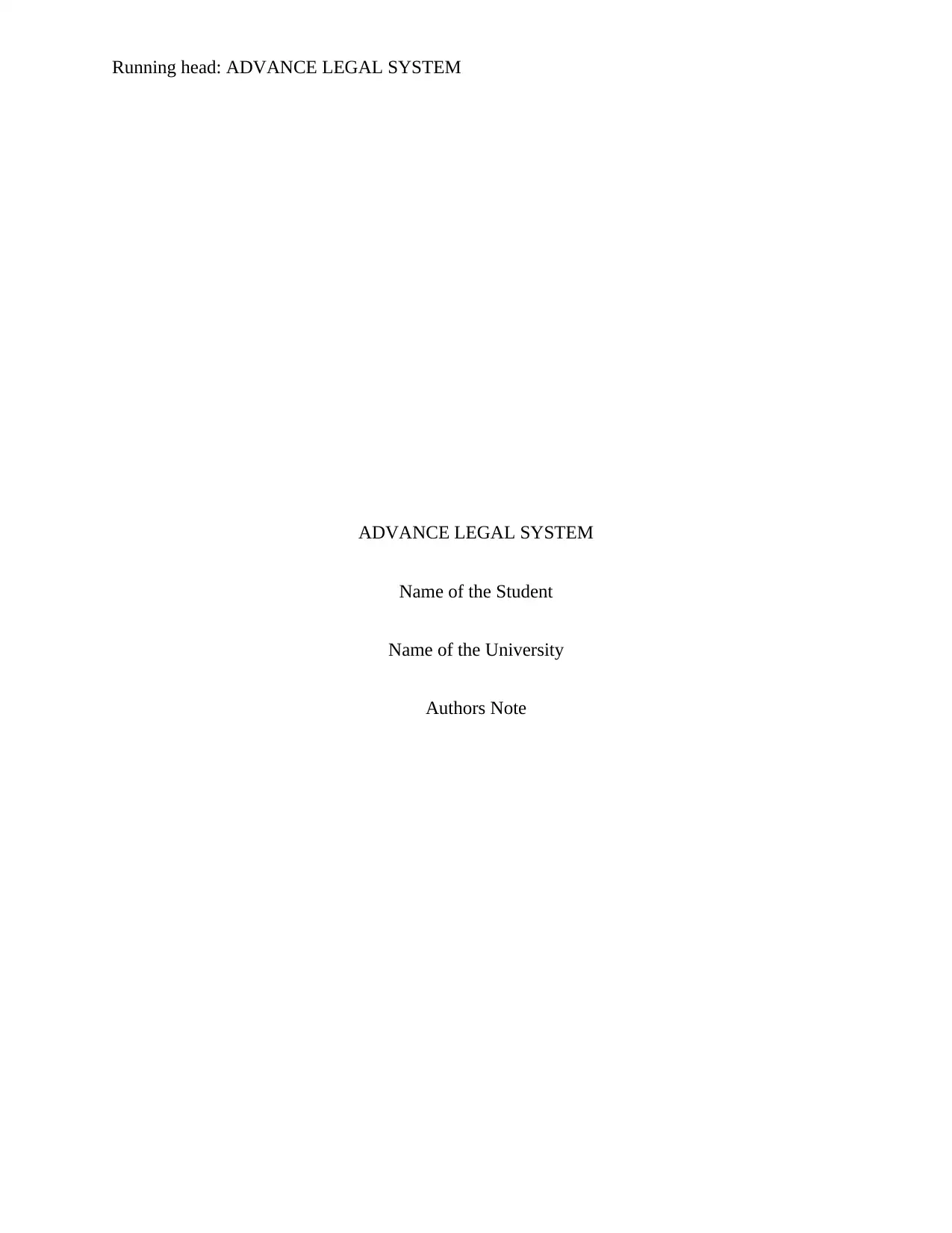
Running head: ADVANCE LEGAL SYSTEM
ADVANCE LEGAL SYSTEM
Name of the Student
Name of the University
Authors Note
ADVANCE LEGAL SYSTEM
Name of the Student
Name of the University
Authors Note
Paraphrase This Document
Need a fresh take? Get an instant paraphrase of this document with our AI Paraphraser
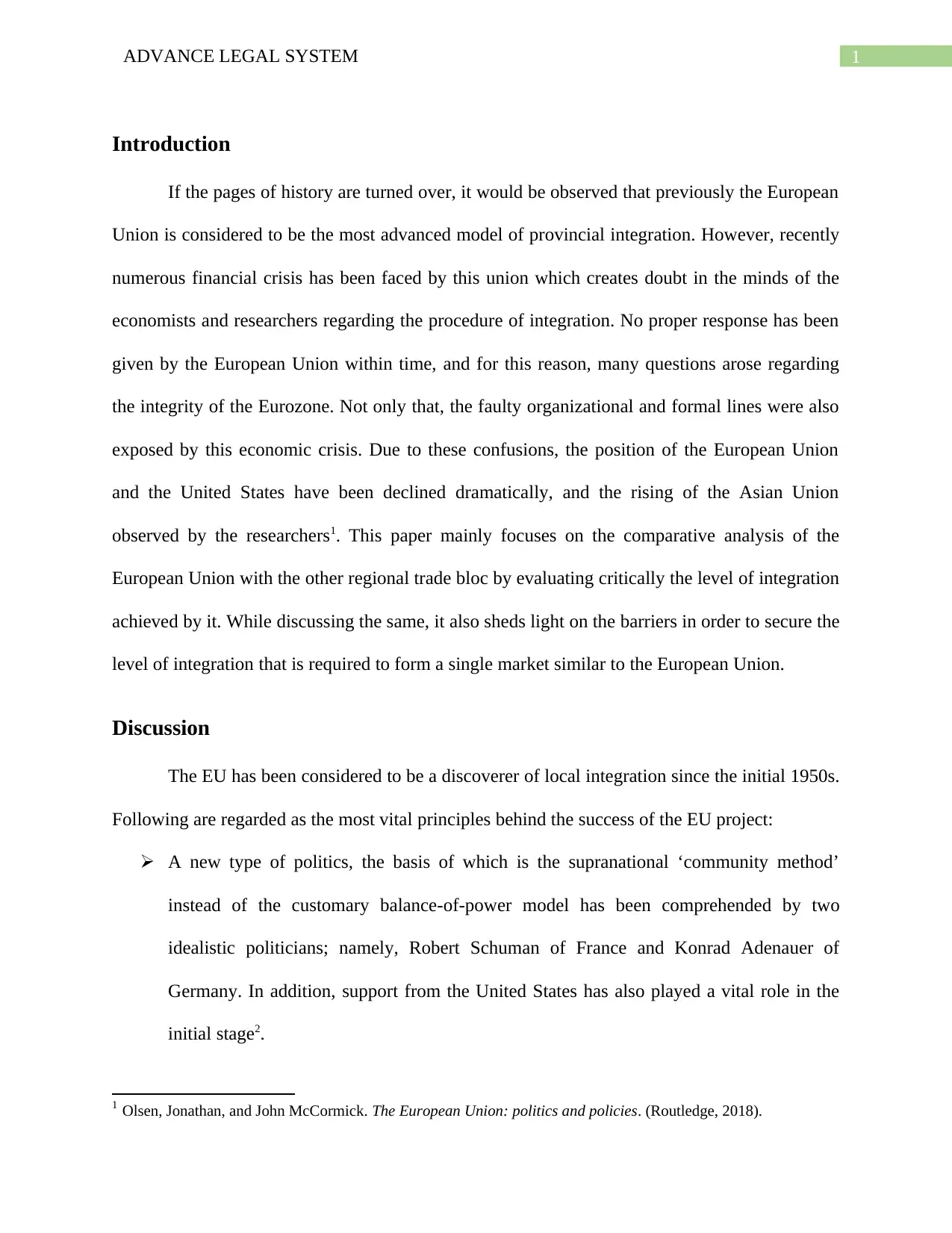
1ADVANCE LEGAL SYSTEM
Introduction
If the pages of history are turned over, it would be observed that previously the European
Union is considered to be the most advanced model of provincial integration. However, recently
numerous financial crisis has been faced by this union which creates doubt in the minds of the
economists and researchers regarding the procedure of integration. No proper response has been
given by the European Union within time, and for this reason, many questions arose regarding
the integrity of the Eurozone. Not only that, the faulty organizational and formal lines were also
exposed by this economic crisis. Due to these confusions, the position of the European Union
and the United States have been declined dramatically, and the rising of the Asian Union
observed by the researchers1. This paper mainly focuses on the comparative analysis of the
European Union with the other regional trade bloc by evaluating critically the level of integration
achieved by it. While discussing the same, it also sheds light on the barriers in order to secure the
level of integration that is required to form a single market similar to the European Union.
Discussion
The EU has been considered to be a discoverer of local integration since the initial 1950s.
Following are regarded as the most vital principles behind the success of the EU project:
A new type of politics, the basis of which is the supranational ‘community method’
instead of the customary balance-of-power model has been comprehended by two
idealistic politicians; namely, Robert Schuman of France and Konrad Adenauer of
Germany. In addition, support from the United States has also played a vital role in the
initial stage2.
1 Olsen, Jonathan, and John McCormick. The European Union: politics and policies. (Routledge, 2018).
Introduction
If the pages of history are turned over, it would be observed that previously the European
Union is considered to be the most advanced model of provincial integration. However, recently
numerous financial crisis has been faced by this union which creates doubt in the minds of the
economists and researchers regarding the procedure of integration. No proper response has been
given by the European Union within time, and for this reason, many questions arose regarding
the integrity of the Eurozone. Not only that, the faulty organizational and formal lines were also
exposed by this economic crisis. Due to these confusions, the position of the European Union
and the United States have been declined dramatically, and the rising of the Asian Union
observed by the researchers1. This paper mainly focuses on the comparative analysis of the
European Union with the other regional trade bloc by evaluating critically the level of integration
achieved by it. While discussing the same, it also sheds light on the barriers in order to secure the
level of integration that is required to form a single market similar to the European Union.
Discussion
The EU has been considered to be a discoverer of local integration since the initial 1950s.
Following are regarded as the most vital principles behind the success of the EU project:
A new type of politics, the basis of which is the supranational ‘community method’
instead of the customary balance-of-power model has been comprehended by two
idealistic politicians; namely, Robert Schuman of France and Konrad Adenauer of
Germany. In addition, support from the United States has also played a vital role in the
initial stage2.
1 Olsen, Jonathan, and John McCormick. The European Union: politics and policies. (Routledge, 2018).
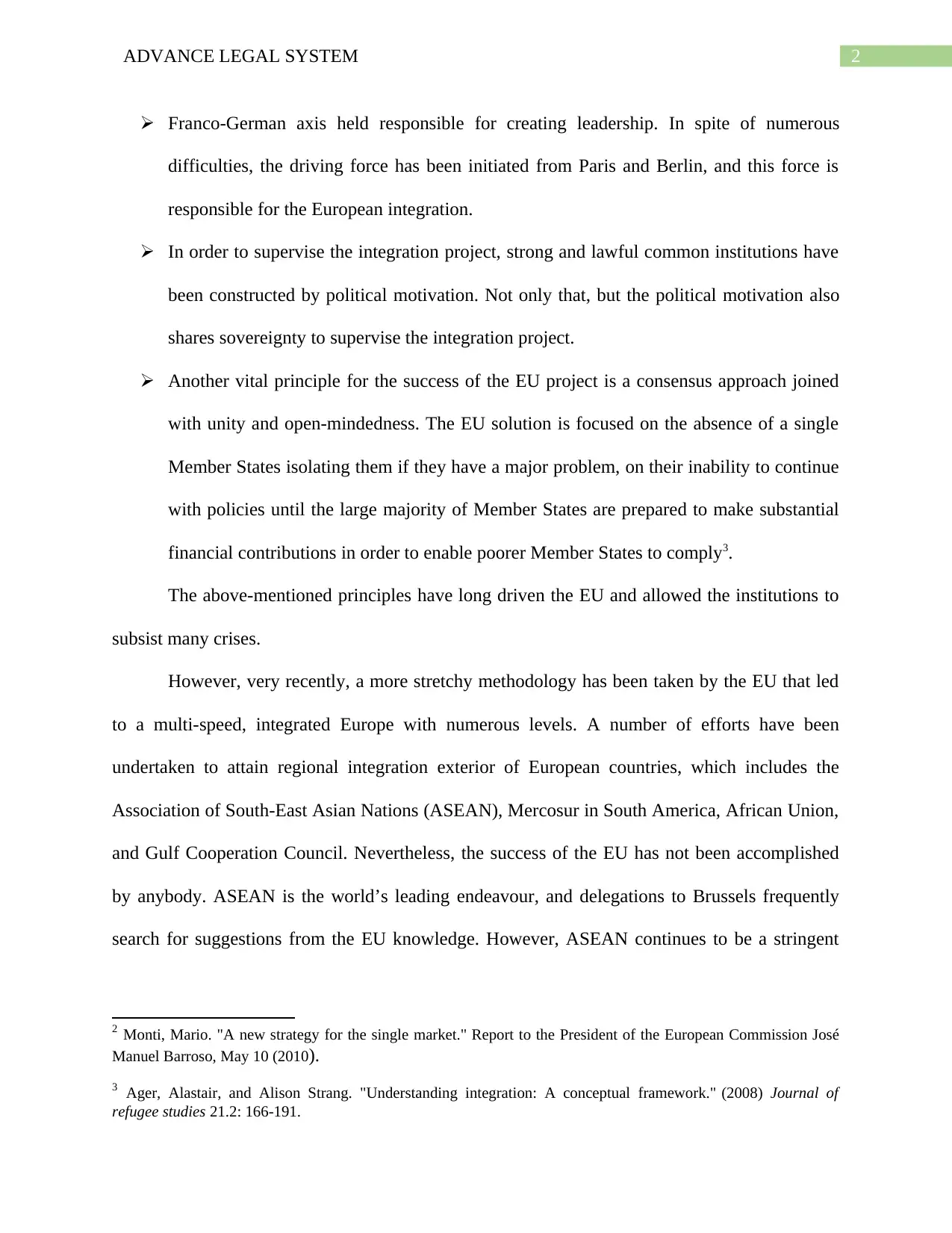
2ADVANCE LEGAL SYSTEM
Franco-German axis held responsible for creating leadership. In spite of numerous
difficulties, the driving force has been initiated from Paris and Berlin, and this force is
responsible for the European integration.
In order to supervise the integration project, strong and lawful common institutions have
been constructed by political motivation. Not only that, but the political motivation also
shares sovereignty to supervise the integration project.
Another vital principle for the success of the EU project is a consensus approach joined
with unity and open-mindedness. The EU solution is focused on the absence of a single
Member States isolating them if they have a major problem, on their inability to continue
with policies until the large majority of Member States are prepared to make substantial
financial contributions in order to enable poorer Member States to comply3.
The above-mentioned principles have long driven the EU and allowed the institutions to
subsist many crises.
However, very recently, a more stretchy methodology has been taken by the EU that led
to a multi-speed, integrated Europe with numerous levels. A number of efforts have been
undertaken to attain regional integration exterior of European countries, which includes the
Association of South-East Asian Nations (ASEAN), Mercosur in South America, African Union,
and Gulf Cooperation Council. Nevertheless, the success of the EU has not been accomplished
by anybody. ASEAN is the world’s leading endeavour, and delegations to Brussels frequently
search for suggestions from the EU knowledge. However, ASEAN continues to be a stringent
2 Monti, Mario. "A new strategy for the single market." Report to the President of the European Commission José
Manuel Barroso, May 10 (2010).
3 Ager, Alastair, and Alison Strang. "Understanding integration: A conceptual framework." (2008) Journal of
refugee studies 21.2: 166-191.
Franco-German axis held responsible for creating leadership. In spite of numerous
difficulties, the driving force has been initiated from Paris and Berlin, and this force is
responsible for the European integration.
In order to supervise the integration project, strong and lawful common institutions have
been constructed by political motivation. Not only that, but the political motivation also
shares sovereignty to supervise the integration project.
Another vital principle for the success of the EU project is a consensus approach joined
with unity and open-mindedness. The EU solution is focused on the absence of a single
Member States isolating them if they have a major problem, on their inability to continue
with policies until the large majority of Member States are prepared to make substantial
financial contributions in order to enable poorer Member States to comply3.
The above-mentioned principles have long driven the EU and allowed the institutions to
subsist many crises.
However, very recently, a more stretchy methodology has been taken by the EU that led
to a multi-speed, integrated Europe with numerous levels. A number of efforts have been
undertaken to attain regional integration exterior of European countries, which includes the
Association of South-East Asian Nations (ASEAN), Mercosur in South America, African Union,
and Gulf Cooperation Council. Nevertheless, the success of the EU has not been accomplished
by anybody. ASEAN is the world’s leading endeavour, and delegations to Brussels frequently
search for suggestions from the EU knowledge. However, ASEAN continues to be a stringent
2 Monti, Mario. "A new strategy for the single market." Report to the President of the European Commission José
Manuel Barroso, May 10 (2010).
3 Ager, Alastair, and Alison Strang. "Understanding integration: A conceptual framework." (2008) Journal of
refugee studies 21.2: 166-191.
⊘ This is a preview!⊘
Do you want full access?
Subscribe today to unlock all pages.

Trusted by 1+ million students worldwide
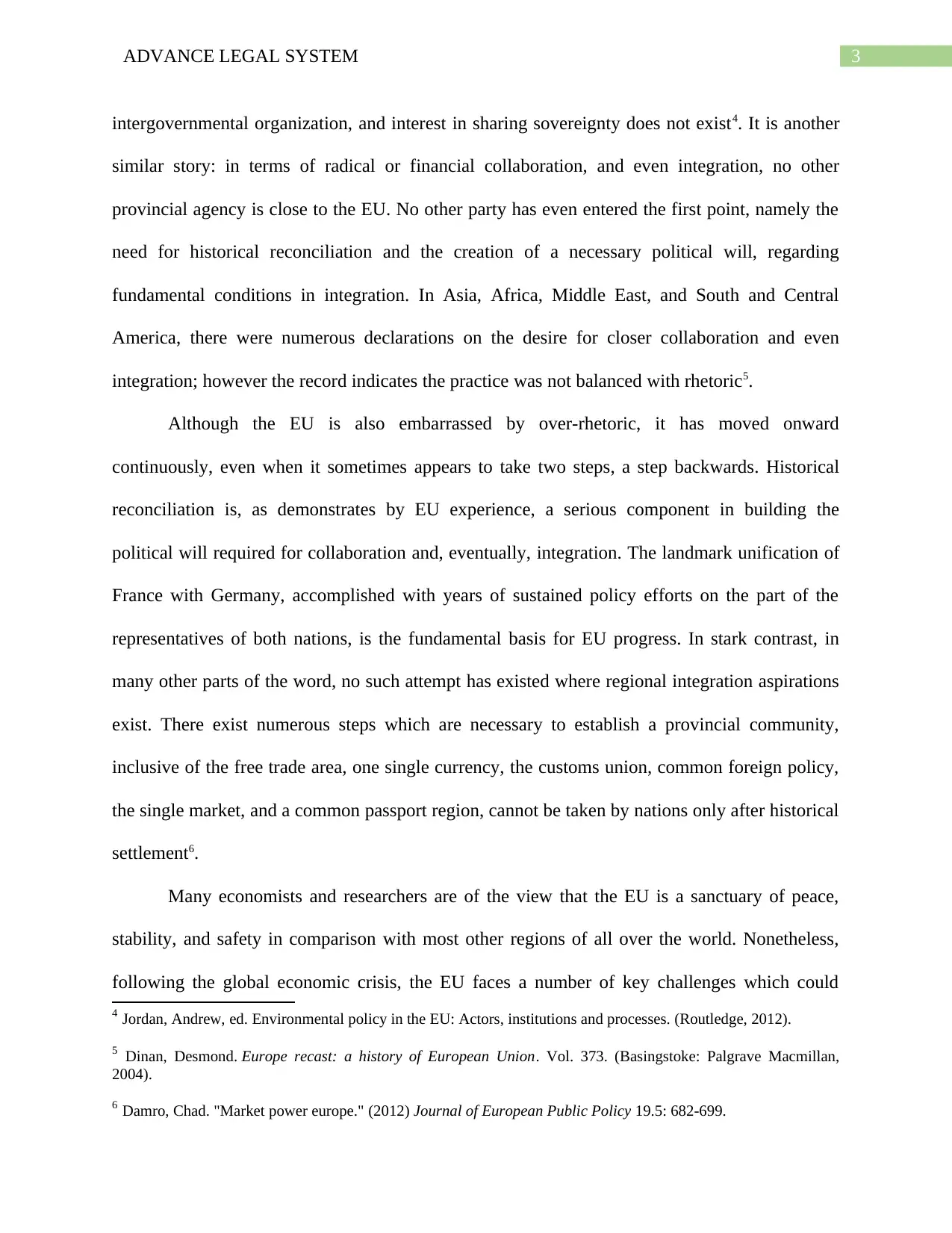
3ADVANCE LEGAL SYSTEM
intergovernmental organization, and interest in sharing sovereignty does not exist4. It is another
similar story: in terms of radical or financial collaboration, and even integration, no other
provincial agency is close to the EU. No other party has even entered the first point, namely the
need for historical reconciliation and the creation of a necessary political will, regarding
fundamental conditions in integration. In Asia, Africa, Middle East, and South and Central
America, there were numerous declarations on the desire for closer collaboration and even
integration; however the record indicates the practice was not balanced with rhetoric5.
Although the EU is also embarrassed by over-rhetoric, it has moved onward
continuously, even when it sometimes appears to take two steps, a step backwards. Historical
reconciliation is, as demonstrates by EU experience, a serious component in building the
political will required for collaboration and, eventually, integration. The landmark unification of
France with Germany, accomplished with years of sustained policy efforts on the part of the
representatives of both nations, is the fundamental basis for EU progress. In stark contrast, in
many other parts of the word, no such attempt has existed where regional integration aspirations
exist. There exist numerous steps which are necessary to establish a provincial community,
inclusive of the free trade area, one single currency, the customs union, common foreign policy,
the single market, and a common passport region, cannot be taken by nations only after historical
settlement6.
Many economists and researchers are of the view that the EU is a sanctuary of peace,
stability, and safety in comparison with most other regions of all over the world. Nonetheless,
following the global economic crisis, the EU faces a number of key challenges which could
4 Jordan, Andrew, ed. Environmental policy in the EU: Actors, institutions and processes. (Routledge, 2012).
5 Dinan, Desmond. Europe recast: a history of European Union. Vol. 373. (Basingstoke: Palgrave Macmillan,
2004).
6 Damro, Chad. "Market power europe." (2012) Journal of European Public Policy 19.5: 682-699.
intergovernmental organization, and interest in sharing sovereignty does not exist4. It is another
similar story: in terms of radical or financial collaboration, and even integration, no other
provincial agency is close to the EU. No other party has even entered the first point, namely the
need for historical reconciliation and the creation of a necessary political will, regarding
fundamental conditions in integration. In Asia, Africa, Middle East, and South and Central
America, there were numerous declarations on the desire for closer collaboration and even
integration; however the record indicates the practice was not balanced with rhetoric5.
Although the EU is also embarrassed by over-rhetoric, it has moved onward
continuously, even when it sometimes appears to take two steps, a step backwards. Historical
reconciliation is, as demonstrates by EU experience, a serious component in building the
political will required for collaboration and, eventually, integration. The landmark unification of
France with Germany, accomplished with years of sustained policy efforts on the part of the
representatives of both nations, is the fundamental basis for EU progress. In stark contrast, in
many other parts of the word, no such attempt has existed where regional integration aspirations
exist. There exist numerous steps which are necessary to establish a provincial community,
inclusive of the free trade area, one single currency, the customs union, common foreign policy,
the single market, and a common passport region, cannot be taken by nations only after historical
settlement6.
Many economists and researchers are of the view that the EU is a sanctuary of peace,
stability, and safety in comparison with most other regions of all over the world. Nonetheless,
following the global economic crisis, the EU faces a number of key challenges which could
4 Jordan, Andrew, ed. Environmental policy in the EU: Actors, institutions and processes. (Routledge, 2012).
5 Dinan, Desmond. Europe recast: a history of European Union. Vol. 373. (Basingstoke: Palgrave Macmillan,
2004).
6 Damro, Chad. "Market power europe." (2012) Journal of European Public Policy 19.5: 682-699.
Paraphrase This Document
Need a fresh take? Get an instant paraphrase of this document with our AI Paraphraser
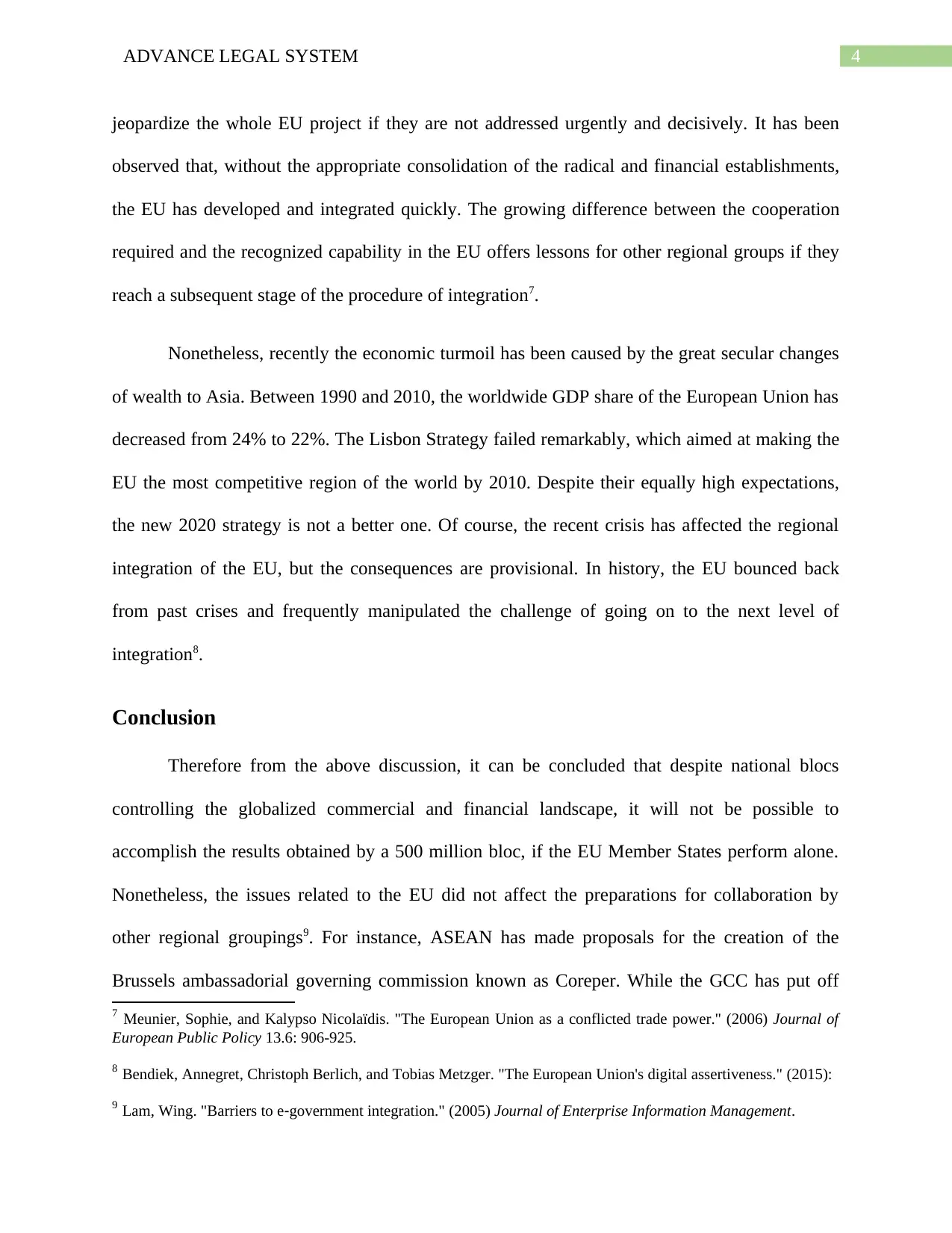
4ADVANCE LEGAL SYSTEM
jeopardize the whole EU project if they are not addressed urgently and decisively. It has been
observed that, without the appropriate consolidation of the radical and financial establishments,
the EU has developed and integrated quickly. The growing difference between the cooperation
required and the recognized capability in the EU offers lessons for other regional groups if they
reach a subsequent stage of the procedure of integration7.
Nonetheless, recently the economic turmoil has been caused by the great secular changes
of wealth to Asia. Between 1990 and 2010, the worldwide GDP share of the European Union has
decreased from 24% to 22%. The Lisbon Strategy failed remarkably, which aimed at making the
EU the most competitive region of the world by 2010. Despite their equally high expectations,
the new 2020 strategy is not a better one. Of course, the recent crisis has affected the regional
integration of the EU, but the consequences are provisional. In history, the EU bounced back
from past crises and frequently manipulated the challenge of going on to the next level of
integration8.
Conclusion
Therefore from the above discussion, it can be concluded that despite national blocs
controlling the globalized commercial and financial landscape, it will not be possible to
accomplish the results obtained by a 500 million bloc, if the EU Member States perform alone.
Nonetheless, the issues related to the EU did not affect the preparations for collaboration by
other regional groupings9. For instance, ASEAN has made proposals for the creation of the
Brussels ambassadorial governing commission known as Coreper. While the GCC has put off
7 Meunier, Sophie, and Kalypso Nicolaïdis. "The European Union as a conflicted trade power." (2006) Journal of
European Public Policy 13.6: 906-925.
8 Bendiek, Annegret, Christoph Berlich, and Tobias Metzger. "The European Union's digital assertiveness." (2015):
9 Lam, Wing. "Barriers to e‐government integration." (2005) Journal of Enterprise Information Management.
jeopardize the whole EU project if they are not addressed urgently and decisively. It has been
observed that, without the appropriate consolidation of the radical and financial establishments,
the EU has developed and integrated quickly. The growing difference between the cooperation
required and the recognized capability in the EU offers lessons for other regional groups if they
reach a subsequent stage of the procedure of integration7.
Nonetheless, recently the economic turmoil has been caused by the great secular changes
of wealth to Asia. Between 1990 and 2010, the worldwide GDP share of the European Union has
decreased from 24% to 22%. The Lisbon Strategy failed remarkably, which aimed at making the
EU the most competitive region of the world by 2010. Despite their equally high expectations,
the new 2020 strategy is not a better one. Of course, the recent crisis has affected the regional
integration of the EU, but the consequences are provisional. In history, the EU bounced back
from past crises and frequently manipulated the challenge of going on to the next level of
integration8.
Conclusion
Therefore from the above discussion, it can be concluded that despite national blocs
controlling the globalized commercial and financial landscape, it will not be possible to
accomplish the results obtained by a 500 million bloc, if the EU Member States perform alone.
Nonetheless, the issues related to the EU did not affect the preparations for collaboration by
other regional groupings9. For instance, ASEAN has made proposals for the creation of the
Brussels ambassadorial governing commission known as Coreper. While the GCC has put off
7 Meunier, Sophie, and Kalypso Nicolaïdis. "The European Union as a conflicted trade power." (2006) Journal of
European Public Policy 13.6: 906-925.
8 Bendiek, Annegret, Christoph Berlich, and Tobias Metzger. "The European Union's digital assertiveness." (2015):
9 Lam, Wing. "Barriers to e‐government integration." (2005) Journal of Enterprise Information Management.

5ADVANCE LEGAL SYSTEM
financial cooperation proposals, this decision stepped up rather than knock-on consequences as a
consequence of provincial contentions over the eurozone difficulties.
financial cooperation proposals, this decision stepped up rather than knock-on consequences as a
consequence of provincial contentions over the eurozone difficulties.
⊘ This is a preview!⊘
Do you want full access?
Subscribe today to unlock all pages.

Trusted by 1+ million students worldwide
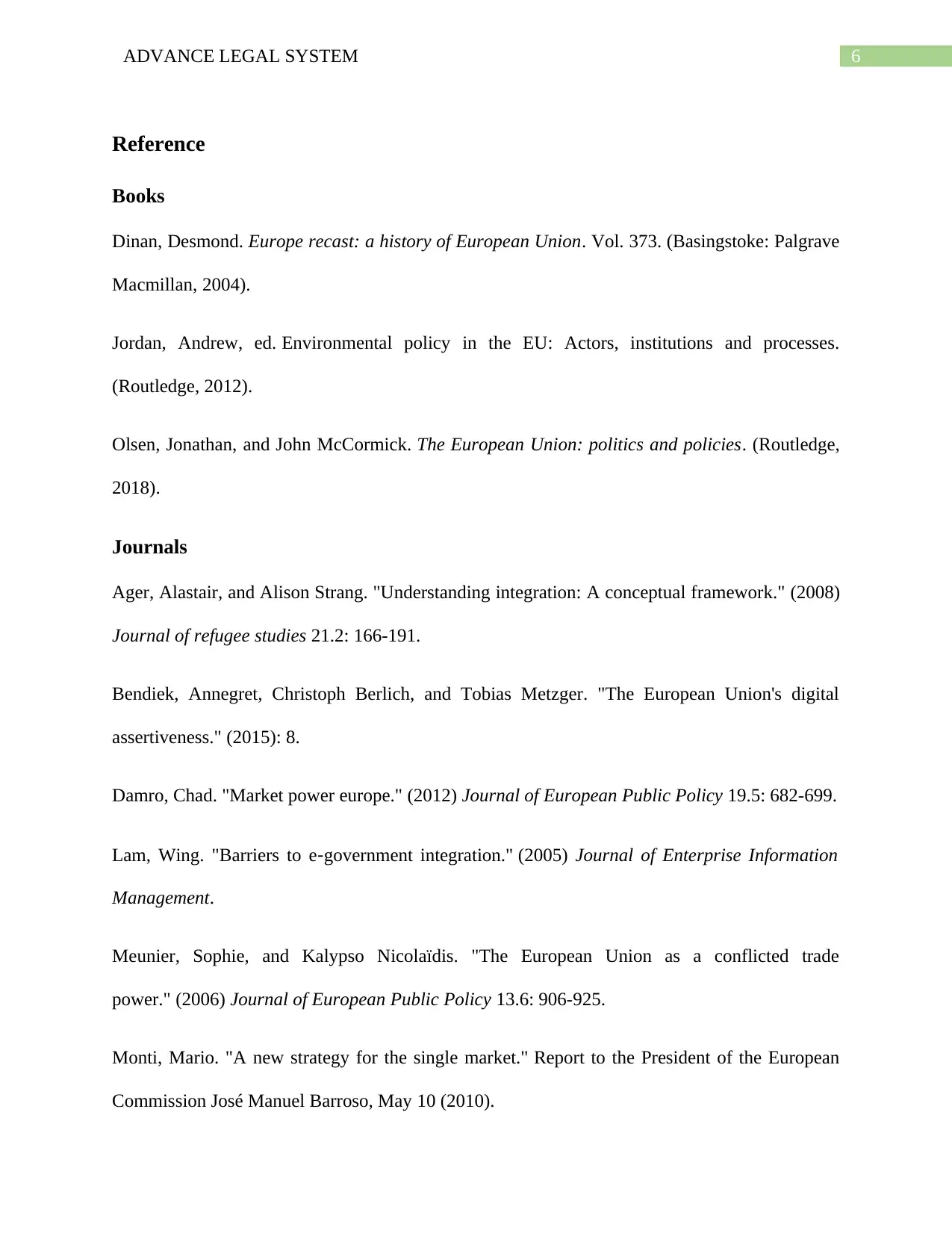
6ADVANCE LEGAL SYSTEM
Reference
Books
Dinan, Desmond. Europe recast: a history of European Union. Vol. 373. (Basingstoke: Palgrave
Macmillan, 2004).
Jordan, Andrew, ed. Environmental policy in the EU: Actors, institutions and processes.
(Routledge, 2012).
Olsen, Jonathan, and John McCormick. The European Union: politics and policies. (Routledge,
2018).
Journals
Ager, Alastair, and Alison Strang. "Understanding integration: A conceptual framework." (2008)
Journal of refugee studies 21.2: 166-191.
Bendiek, Annegret, Christoph Berlich, and Tobias Metzger. "The European Union's digital
assertiveness." (2015): 8.
Damro, Chad. "Market power europe." (2012) Journal of European Public Policy 19.5: 682-699.
Lam, Wing. "Barriers to e‐government integration." (2005) Journal of Enterprise Information
Management.
Meunier, Sophie, and Kalypso Nicolaïdis. "The European Union as a conflicted trade
power." (2006) Journal of European Public Policy 13.6: 906-925.
Monti, Mario. "A new strategy for the single market." Report to the President of the European
Commission José Manuel Barroso, May 10 (2010).
Reference
Books
Dinan, Desmond. Europe recast: a history of European Union. Vol. 373. (Basingstoke: Palgrave
Macmillan, 2004).
Jordan, Andrew, ed. Environmental policy in the EU: Actors, institutions and processes.
(Routledge, 2012).
Olsen, Jonathan, and John McCormick. The European Union: politics and policies. (Routledge,
2018).
Journals
Ager, Alastair, and Alison Strang. "Understanding integration: A conceptual framework." (2008)
Journal of refugee studies 21.2: 166-191.
Bendiek, Annegret, Christoph Berlich, and Tobias Metzger. "The European Union's digital
assertiveness." (2015): 8.
Damro, Chad. "Market power europe." (2012) Journal of European Public Policy 19.5: 682-699.
Lam, Wing. "Barriers to e‐government integration." (2005) Journal of Enterprise Information
Management.
Meunier, Sophie, and Kalypso Nicolaïdis. "The European Union as a conflicted trade
power." (2006) Journal of European Public Policy 13.6: 906-925.
Monti, Mario. "A new strategy for the single market." Report to the President of the European
Commission José Manuel Barroso, May 10 (2010).
1 out of 7
Related Documents
Your All-in-One AI-Powered Toolkit for Academic Success.
+13062052269
info@desklib.com
Available 24*7 on WhatsApp / Email
![[object Object]](/_next/static/media/star-bottom.7253800d.svg)
Unlock your academic potential
Copyright © 2020–2026 A2Z Services. All Rights Reserved. Developed and managed by ZUCOL.





